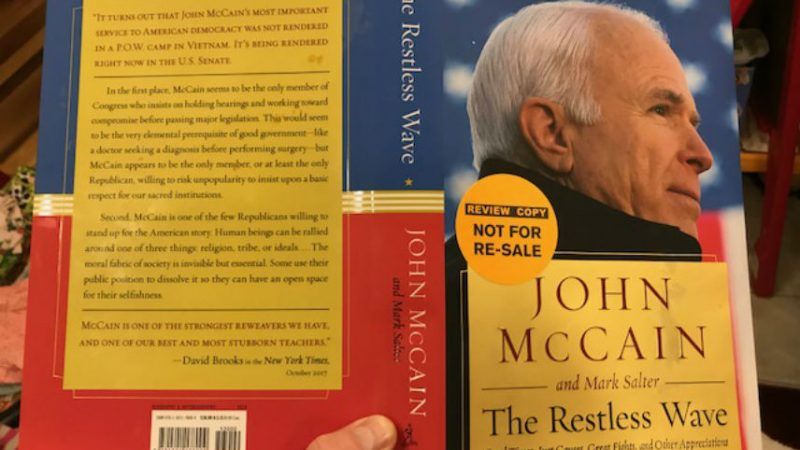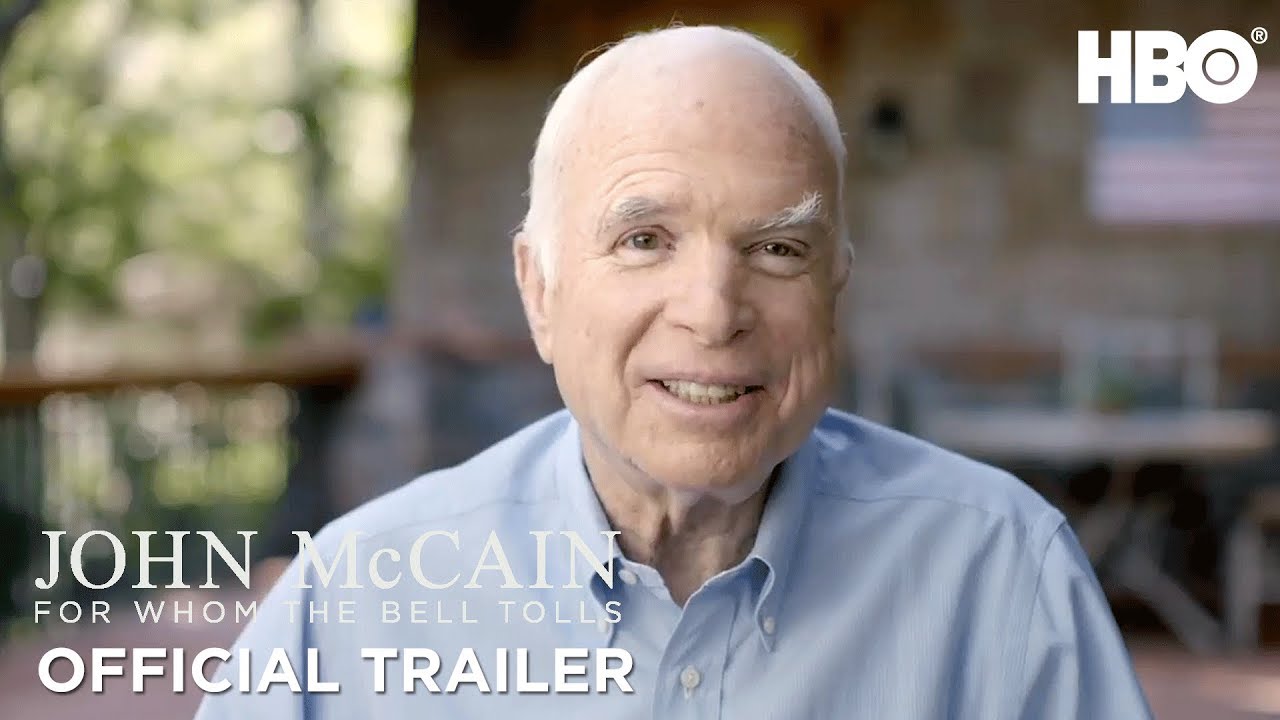9 Times John McCain Slams Conservative Media in New Book
One reason the national political press has almost always liked the Arizona maverick? He shares their disdain for the conservative media bubble.


Today is publication day for John McCain's career-capping book, The Restless Wave: Good Times, Just Causes, Great Fights, and Other Appreciations, co-written with longtime speechwriter Mark Salter. I have written here previously about the book's surprising (though unsurprisingly unreflective) admission that the Iraq War was a "mistake," and also its unrepentance about accusing Sen. Rand Paul (R-Ky.) last year of "working for Vladimir Putin."
The combination of the book, the forthcoming Memorial Day HBO documentary John McCain: For Whom the Bell Tolls, and the busy end-of-life arrangements are producing what Politico media columnist Jack Shafer calls "the last McCain swoon" from America's political journalists. "Not even Derek Jeter and David Ortiz were flurried with as much confetti when they departed," Shafer acidly observes.
There are many causes for the liberal media's long and only briefly interrupted (in 2008) love affair with this Republican politician, many of which I get into my 2007 book, as well as posts here from 2008. But key among them is that like many elitists, McCain shares with the national political media an unconcealed disdain for swaths of the GOP grassroots, particularly as amplified by the conservative media.
"Stop listening to the bombastic loudmouths on the radio and television and the Internet," the senator said during his dramatic Senate speech last summer. "To hell with them. They don't want anything done for the public good. Our incapacity is their livelihood."
Here, in language frequently indistinguishable from that of New York Times reporters, are nine instances in Restless Wave where McCain excoriates the conservative media:
1) Describing his fight with Mitt Romney for the 2008 GOP presidential nomination:
I was also on the receiving end of daily attacks from talk radio blowhards. They had some effect, but they aren't as influential as they like their listeners to believe. They make quite a living from promoting polarization in the country, and scaring politicians who can only win races in gerrymandered districts.
2) While complaining mildly about the media's pro-Obama bias during the general election:
But given the media environment we live in today, where we can restrict information gathering to sources that tell us only what we want to hear, where crackpot conspiracy websites like InfoWars and Breitbart, and Russian propagandists such as Russia Today and WikiLeaks, are taken more seriously by their credulous followers than journalism practiced with professional standards and ethics, the problem of routine liberal bias in the media seems positively quaint.
3) Talking about his famous "No ma'am. He's a decent family man, citizen" comment about Obama:
Obviously, this was before our contemporary understanding of how the Internet is used to spread conspiracy theories and calumnies about candidates to people with an appetite for that sort of thing or an inability to discern what could be true from something spawned in the fever dreams of people who should probably seek psychiatric help. Today, of course, Internet nuts and haters find willing recipients for their "ideas" on certain cable news and talk radio shows.
4) Explaining why he didn't accept Teddy Kennedy's invitation to switch parties after the 2000 election:
I was a Republican, a Reagan Republican. Still am. Not a Tea Party Republican. Not a Breitbart Republican. Not a talk radio or Fox News Republican. Not an isolationist, protectionist, immigrant-bashing, scapegoating, get-nothing-useful-done Republican.
5) Sketching out his personal creed:
I believe in the separation of powers, a press free to report without fear or favor, and free to infuriate politicians—including me—as they do. Lastly, I believe in principled compromises that move the country forward, goodwill toward Man, and empirical facts.
6) Talking about anti-immigration conservatives:
There are politicians today who would have Americans believe that illegal immigration is one of the worst scourges afflicting the country. Some who espouse that nonsense believe it to be true. Their opinions were formed in restricted information loops as they communicate mostly or exclusively with people who believe the same. Many more know it isn't so, and are cynically claiming otherwise for one of a couple reasons. I expect most are identifying a scapegoat people can blame for their dissatisfaction because it suggests there is an easy fix for difficult problems, an easy fix that's easy to campaign on. Others are doing it for more sinister reasons they're reluctant to acknowledge publicly, including racial prejudice. Whatever their reasons, the cynical and the ignorant promotion of false information and unnecessary fear have the same outcome. Decent, hardworking people who mean no harm are blamed for crime, unemployment, failing schools, and various other ills, and become in the eyes of many the objects of hate and fear.
7) Regarding the 2006 efforts at comprehensive immigration reform:
The issue was starting to heat up on the Far Right. Bashing illegal immigrants proved popular with conservative talk radio audiences, and if any industry enjoys beating dead horses, it's conservative talk radio. Honestly, having to dream up more hyperbole on the same damn subject day after day would bore the hell of me.
8) In a section about his handling of the Russian dossier:
So, I've been to crazy town before, and I've seen how impervious to reason, facts, and common sense these delusions can be. Most are still the work of nuts and frauds, but they proliferate like never before and persist forever on the world wide web. I noted the traffic of absurd conspiracies in the 2016 campaign, and we know now that many of them were conceived and disseminated by Russia, which makes their embrace by politicians too gullible to dismiss them or too shameless to resist exploiting them all the more disconcerting. But those kinds of politicians were around before the advent of the Internet, too. From Joe McCarthy acolytes to moon landing deniers to 9/11 Truthers and Obama Birthers, there has always been a market for "the paranoid style in American politics," as historian Richard Hofstadter termed it.
9) Bemoaning gridlock:
There are a lot of contributing factors to the gridlock that frustrates so many. Chief among them is how much more polarized we are as a society. We are secluding ourselves in ideological ghettos. We don't have to debate rationally or even be exposed to ideas that contradict ours. We have our own news sources. We exchange ideas mostly or exclusively with people who agree with us, and troll those who don't. Increasingly, we have our own facts to reinforce our convictions and any empirical evidence that disputes them is branded as "fake." That's a social trend that is going to be very hard to turn around given the prevalence in our daily lives of media and communications technologies that enable it.


Show Comments (119)